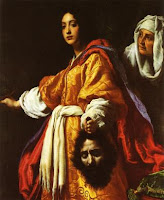 Please read through a portion (one or two chapters is enough) of any of the Deuterocanonical books (the books included in Catholic and Greek Orthodox Bibles, but not usually included in Protestant Bibles). I recommend especially Ecclesiasticus (Sirach), but the other books are worth looking at as well.
Please read through a portion (one or two chapters is enough) of any of the Deuterocanonical books (the books included in Catholic and Greek Orthodox Bibles, but not usually included in Protestant Bibles). I recommend especially Ecclesiasticus (Sirach), but the other books are worth looking at as well.Note what you find particularly interesting in the selection you read. Would you ever read through the Deuterocanonicals on your own? Why, or why not?
If you have fallen behind on the blogs, you meet do additional entries on other Deuterocanonical books. [Please note: the link I give here has a pretty idiosyncratic list of the Apocrypha. "Bel and the Dragon" and "Susannah" are usually just called "additions to Daniel" and that's where you will find them in most Catholic Bibles.]
I find it interesting how similar Sirach chapter 21 is to the Bible. In verse six it states, " but he that feareth the Lord will repent from his heart." This is very similar to the Bible in the sense that all believers fear God and repent. In verses 9 and 10, it states, "9 The congregation of the wicked is like tow wrapped together: and the end of them is a flame of fire to destroy them. 10 The way of sinners is made plain with stones, but at the end thereof is the pit of hell." This is eerily similar to the second coming of Christ. In the Bible it states that. Christ will return to collect the grain. The good grain he will take, the bad grain he will burn.
ReplyDeleteHonestly, I would look through it on my own because it is interesting to see what other religions believe so you can compare and contrast them. It gives you something interesting to do.
I with through Chapter 11 where it talks about how the works of men are incompent compared to God. In verse 11:9 "Strive not in a matter that concerneth thee not; and sit not in judgment with sinners." Which it is saying not to live in sin. But too have Grace and also that it is not really your concern. If someone outside of God is sinning. I also like verse 11:15 "Wisdom, knowledge, and understanding of the law, are of the Lord: love, and the way of good works, are from him." It is stating that God is the ultimate good. -Austin Dreyer
ReplyDeleteI read Apocrypha, Sirach Chapters 1-2. A few verses that immediately stood out to me were Chapter 1:1-22
ReplyDelete"Who can number the sand of the sea, and the drops of rain, and the days of eternity?3 Who can find out the height of heaven, and the breadth of the earth, and the deep, and wisdom?4 Wisdom hath been created before all things, and the understanding of prudence from everlasting."
These verses feel extremely like Job. It's very who are you to challenge God? Type of tone.
I think I might read it. I would like to know what the Catholic bible says, in comparison the protestant. Also sounds well written.
Walker Larson
I chose the Book of Judith. We discussed this book in class, but I had heard about it before and always found it rather interesting. Even in my art history class, we discussed a multiple depictions of Judith's killing of Holofernes, so it shows that the story definitely has made an impact.
ReplyDeleteIt also reminds me of the story of Jael and Sisera in the book of Judges in the Old Testament, when Jael drives a wooden tent peg through the skull of the commander of the Canaanite army. This could be why this book wasn't added to the Protestant Bible(?). I think I would read through some other Deuterocanonical books in the future. They're pretty neat.
-Lauren Bland
As a Catholic I am very familiar with the Deuterocanonical books of the Bible. I grew up hearing them and reading them along with the rest of the books of the Bible. I did not know that Protestants did not also have these books in their Bibles until I was in high school and I was floored by the information.
ReplyDeleteGrowing up the deuterocanonical book(s) I heard the most was/were 1st and 2nd Maccabees as they are some of my dad’s favorite books. My personal favorite deuterocanonical book is the Wisdom of Ben Sira/Sirach because I really enjoy the format and the well crafted maxims.